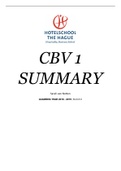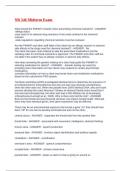Law of Contract
1. THE PRIVITY OF CONTRACT RULE
The doctrine of privity of contract confines the effect of a contract to the parties of that contract. It
constitutes the basic dividing line in the law of obligations between the law of contract and tort law.
A sells goods to B. B resells the goods to C. The goods are defective. C can sue B in contract. B can sue A.
But C cannot sue A in contract simply because they are not parties to the same contract; there is no
contractual privity between them. It follows that if B is insolvent, C’s contractual rights are worthless. C
may or may not be able to sue A in tort.
Two aspects to the privity rule:
1. A contract cannot impose a burden on a third party (TP). This is common sense and
uncontroversial. A and B cannot by agreement between themselves impose a legally
enforceable obligation on C.
2. A contract cannot confer a benefit on a third party. A and B cannot by agreement between
themselves confer a legally enforceable benefit on C. A contracts with B to give £100 to C in
return for consideration provided by B. If A fails to pay C, C cannot sue A even if the contract
provides that C does have a right to enforce A’s promise. See Tweddle v Atkinson (1861) 1 B & S
393.
The second aspect of the rule is controversial:
Contract law consistently emphasises the importance of the parties’ intentions (in ascertaining whether
a contract is concluded, the terms of a contract and their construction, the impact of a radical difference
between the parties’ understanding or intentions and the reality, and the measure of damages). So why
thwart the parties’ wishes with respect to TP benefits?
The laws of many other countries have no problem in recognising that a contract for the benefit of a
third party should confer enforceable rights on TP. So why does English law have this restriction? Never
clearly explained by the courts.
o Promisee cannot enforce promise if it is gratuitous; consideration is the price for the
right to enforce a promise. Why should TP be entitled to enforce where TP has provided
no consideration? Elides two separate issues: (1) whether consideration has been
provided by the promisee so as to render the promise non-gratuitous and create a
binding contract, and (2), where consideration has been provided, who can enforce the
promise.
o Contractual promises are given in return for consideration provided by the other party
(‘must move from the promisee’). Again relates to how a contract is created, not
necessarily to the question of who can enforce it.
o Practical issue: if contract enforceable by TP, could the parties still vary or rescind their
contract and thereby alter or destroy TP’s rights? If yes in principle, would this still be
the case if TP altered its position in reliance on the contract?
1
, Law of Contract
2. RESPONSES TO A PRIVITY PROBLEM PRE-1999
(a) Find Another Contract
If a contractual chain of A – B – C creates the privity problem that there is no contract
between A and C, sometimes it is possible to find another contract between A and C, ie in
return for C doing something, A makes a promise directly to C.
o Shanklin Pier v Detel Products Ltd [1951] 2 KB 854: D represented to C that certain
paint it sold would be suitable for C’s pier and would last seven years; C employed A
to do the painting and instructed A to buy and use D’s paint; A did so, but the paint
lasted only 3 months. C could not sue D under the contract of sale because the paint
was bought by A. Held: C could sue D under collateral contract that paint would last
seven years; C provided consideration by instructing A to purchase paint from D.
o New Zealand Shipping Co Ltd v AM Satterthwaite &Co Ltd (The Eurymedon) [1975] AC
154: cargo owner – carrier – stevedores; in return for stevedores performing their
contract with the carrier, the cargo owners promised to extend to the stevedores the
benefit of the exemption clause in the contract between the cargo owner and the
carrier; the carriers acted as agents of the stevedores for the purpose of concluding
the collateral contract; the stevedores provided consideration by performing their
contract with the carriers.
(b) Rely On Remedies Available To The Promisee
Promisee can of course seek remedies against the promisor
o Beswick v Beswick [1968] AC 58: Peter Beswick transferred his coal merchant’s
business to his nephew John Beswick in consideration for JB employing him as a
consultant at a weekly fee for the rest of PB’s life and after PB’s death to pay PB’s
wife, Ruth Beswick, the weekly sum of £5; 20 months later, PB died intestate; JB left
£5 at RB’s house on the day of PB’s funeral but repudiated any further liability to her;
about 8 months after PB died, RB obtained letters of administration of PB’s estate;
RB then sued JB for specific performance in her own right and as administratrix of
PB’s estate. HL: in her own right, as TP of a contract for her benefit, RB had no right
to sue; as administratrix of PB’s estate she was entitled to specific performance.
But this depends on
o There being an appropriate remedy available to the promisee (there is complicated
law on this point).
2
1. THE PRIVITY OF CONTRACT RULE
The doctrine of privity of contract confines the effect of a contract to the parties of that contract. It
constitutes the basic dividing line in the law of obligations between the law of contract and tort law.
A sells goods to B. B resells the goods to C. The goods are defective. C can sue B in contract. B can sue A.
But C cannot sue A in contract simply because they are not parties to the same contract; there is no
contractual privity between them. It follows that if B is insolvent, C’s contractual rights are worthless. C
may or may not be able to sue A in tort.
Two aspects to the privity rule:
1. A contract cannot impose a burden on a third party (TP). This is common sense and
uncontroversial. A and B cannot by agreement between themselves impose a legally
enforceable obligation on C.
2. A contract cannot confer a benefit on a third party. A and B cannot by agreement between
themselves confer a legally enforceable benefit on C. A contracts with B to give £100 to C in
return for consideration provided by B. If A fails to pay C, C cannot sue A even if the contract
provides that C does have a right to enforce A’s promise. See Tweddle v Atkinson (1861) 1 B & S
393.
The second aspect of the rule is controversial:
Contract law consistently emphasises the importance of the parties’ intentions (in ascertaining whether
a contract is concluded, the terms of a contract and their construction, the impact of a radical difference
between the parties’ understanding or intentions and the reality, and the measure of damages). So why
thwart the parties’ wishes with respect to TP benefits?
The laws of many other countries have no problem in recognising that a contract for the benefit of a
third party should confer enforceable rights on TP. So why does English law have this restriction? Never
clearly explained by the courts.
o Promisee cannot enforce promise if it is gratuitous; consideration is the price for the
right to enforce a promise. Why should TP be entitled to enforce where TP has provided
no consideration? Elides two separate issues: (1) whether consideration has been
provided by the promisee so as to render the promise non-gratuitous and create a
binding contract, and (2), where consideration has been provided, who can enforce the
promise.
o Contractual promises are given in return for consideration provided by the other party
(‘must move from the promisee’). Again relates to how a contract is created, not
necessarily to the question of who can enforce it.
o Practical issue: if contract enforceable by TP, could the parties still vary or rescind their
contract and thereby alter or destroy TP’s rights? If yes in principle, would this still be
the case if TP altered its position in reliance on the contract?
1
, Law of Contract
2. RESPONSES TO A PRIVITY PROBLEM PRE-1999
(a) Find Another Contract
If a contractual chain of A – B – C creates the privity problem that there is no contract
between A and C, sometimes it is possible to find another contract between A and C, ie in
return for C doing something, A makes a promise directly to C.
o Shanklin Pier v Detel Products Ltd [1951] 2 KB 854: D represented to C that certain
paint it sold would be suitable for C’s pier and would last seven years; C employed A
to do the painting and instructed A to buy and use D’s paint; A did so, but the paint
lasted only 3 months. C could not sue D under the contract of sale because the paint
was bought by A. Held: C could sue D under collateral contract that paint would last
seven years; C provided consideration by instructing A to purchase paint from D.
o New Zealand Shipping Co Ltd v AM Satterthwaite &Co Ltd (The Eurymedon) [1975] AC
154: cargo owner – carrier – stevedores; in return for stevedores performing their
contract with the carrier, the cargo owners promised to extend to the stevedores the
benefit of the exemption clause in the contract between the cargo owner and the
carrier; the carriers acted as agents of the stevedores for the purpose of concluding
the collateral contract; the stevedores provided consideration by performing their
contract with the carriers.
(b) Rely On Remedies Available To The Promisee
Promisee can of course seek remedies against the promisor
o Beswick v Beswick [1968] AC 58: Peter Beswick transferred his coal merchant’s
business to his nephew John Beswick in consideration for JB employing him as a
consultant at a weekly fee for the rest of PB’s life and after PB’s death to pay PB’s
wife, Ruth Beswick, the weekly sum of £5; 20 months later, PB died intestate; JB left
£5 at RB’s house on the day of PB’s funeral but repudiated any further liability to her;
about 8 months after PB died, RB obtained letters of administration of PB’s estate;
RB then sued JB for specific performance in her own right and as administratrix of
PB’s estate. HL: in her own right, as TP of a contract for her benefit, RB had no right
to sue; as administratrix of PB’s estate she was entitled to specific performance.
But this depends on
o There being an appropriate remedy available to the promisee (there is complicated
law on this point).
2











